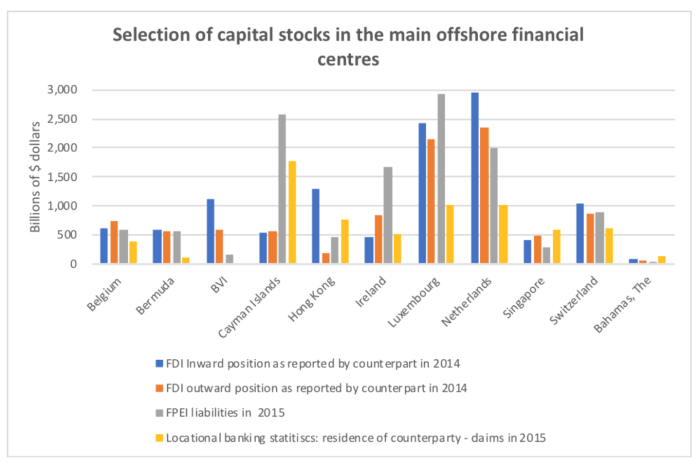Offshore Financial Market, a realm of global finance often shrouded in mystery, operates beyond the traditional borders of national regulatory systems. This intricate network of financial centers facilitates a wide array of services, attracting high-net-worth individuals, multinational corporations, and financial institutions seeking advantages in taxation, regulatory environments, and asset protection. Understanding its complexities is crucial for navigating the global economic landscape.
This exploration delves into the defining characteristics of offshore financial centers, examining the types of services provided, the key players involved, and the regulatory frameworks that govern their operations. We’ll analyze the economic impacts, both positive and negative, and address the persistent concerns surrounding tax evasion and money laundering. Finally, we’ll project future trends and anticipate the evolving challenges and opportunities within this dynamic sector.
Transparency and Tax Evasion Concerns: Offshore Financial Market

Offshore financial markets, while offering legitimate benefits such as investment diversification and asset protection, have also been criticized for their role in facilitating illicit financial activities, primarily tax evasion and money laundering. The opaque nature of these markets, coupled with weak regulatory frameworks in some jurisdictions, creates an environment conducive to these illegal practices. This section examines the mechanisms used for tax evasion, the efforts undertaken to improve transparency, and the persistent challenges in combating these issues.Offshore financial centers often provide tools that enable individuals and corporations to conceal assets and income from tax authorities in their home countries.
This undermines national tax systems, reducing government revenue and potentially impacting public services. The lack of comprehensive information sharing between jurisdictions further complicates efforts to track and prosecute tax evaders.
Mechanisms for Tax Evasion via Offshore Finance
Tax evasion through offshore structures often involves complex arrangements designed to obscure the true ownership and movement of funds. Common techniques include establishing shell companies in tax havens with minimal disclosure requirements, utilizing intricate web of trusts and foundations to obscure beneficial ownership, and exploiting loopholes in international tax treaties. For instance, the use of sophisticated tax planning strategies, such as the utilization of complex holding companies in low-tax jurisdictions to redirect profits, has been a recurring method.
Another example is the use of nominee directors and shareholders to mask the true beneficial owners of assets held offshore. These methods effectively create a veil of secrecy around financial transactions, making it difficult for tax authorities to trace the flow of funds and assess the correct tax liability.
Measures to Enhance Transparency and Combat Illicit Financial Flows
In response to growing concerns, various measures have been implemented to increase transparency and combat illicit financial flows. These include the adoption of international standards such as the Common Reporting Standard (CRS), which mandates the automatic exchange of financial account information between participating jurisdictions. The CRS aims to curtail the use of offshore accounts for tax evasion by requiring financial institutions to report information about their account holders to their tax authorities, who then share this information with other participating countries.
Furthermore, initiatives like the Beneficial Ownership Register aim to identify the ultimate beneficial owners of companies and trusts, thereby making it more difficult to conceal assets and income. Increased international cooperation and information sharing among tax authorities are also crucial components of these efforts.
Challenges in Addressing Tax Evasion in Offshore Finance
Despite these efforts, significant challenges remain in tackling tax evasion through offshore financial markets. The complexity of international financial structures, the jurisdictional limitations of enforcement, and the continuous evolution of tax evasion techniques present ongoing obstacles. The lack of consistent and comprehensive regulation across all jurisdictions creates loopholes that can be exploited by those seeking to evade taxes.
Moreover, the resources required for effective enforcement, both in terms of personnel and technology, can be substantial, particularly for smaller tax authorities. The difficulty in obtaining sufficient evidence to prove intentional tax evasion, given the sophisticated nature of many offshore structures, also poses a significant challenge.
Examples of International Initiatives Aimed at Improving Transparency
The Global Forum on Transparency and Exchange of Information for Tax Purposes, a body of the OECD, plays a key role in promoting international cooperation in tax matters. The Forum’s work focuses on the implementation and monitoring of the CRS and other international standards aimed at enhancing transparency and combating tax evasion. Another important initiative is the Financial Action Task Force (FATF), an intergovernmental organization that develops and promotes international standards for combating money laundering and terrorist financing.
FATF’s recommendations are widely adopted by countries around the world and provide a framework for addressing the risks associated with offshore financial centers. These initiatives represent a concerted global effort to address the challenges posed by tax evasion through offshore finance.
Future Trends and Developments

The offshore financial market is poised for significant transformation in the coming years, driven by technological advancements, evolving regulatory frameworks, and shifting global economic dynamics. Understanding these trends is crucial for both participants and regulators seeking to navigate this complex and ever-changing landscape. The interplay of these forces will shape the future of offshore finance, presenting both challenges and opportunities.
Technological advancements are fundamentally reshaping the offshore financial market, impacting everything from transaction processing to regulatory oversight. The rise of fintech, blockchain technology, and artificial intelligence presents both opportunities and risks. Increased automation and data analytics are enhancing efficiency and reducing costs, while also raising concerns about data security and potential for misuse. The regulatory landscape is simultaneously adapting to these technological disruptions, seeking to maintain stability and prevent illicit activities.
Technological Advancements and Their Impact, Offshore Financial Market
The integration of technologies like blockchain offers the potential for increased transparency and traceability of financial transactions. This could help mitigate risks associated with money laundering and tax evasion, key concerns in the offshore sector. Conversely, the decentralized and anonymous nature of some cryptocurrencies also presents challenges for regulators seeking to maintain control and oversight. The use of AI and machine learning in fraud detection and risk assessment is likely to become increasingly prevalent, improving the efficiency of compliance efforts.
However, the ethical implications of using AI in financial decision-making require careful consideration. For example, algorithmic bias could inadvertently discriminate against certain users or jurisdictions.
The Evolving Regulatory Landscape and its Implications
Increased international cooperation and information sharing are central to the evolving regulatory landscape. Initiatives like the Common Reporting Standard (CRS) have significantly improved transparency by requiring automatic exchange of financial account information between participating jurisdictions. This has made it more difficult for individuals and entities to evade taxes through offshore accounts. Furthermore, the Organization for Economic Co-operation and Development (OECD) continues to play a key role in coordinating global efforts to combat tax evasion and improve transparency in the offshore financial sector.
The impact of these initiatives is a gradual erosion of the traditional secrecy surrounding offshore financial activities. This necessitates adaptation by offshore financial centers, pushing them to focus on providing legitimate financial services and attracting clients based on value-added services rather than solely on secrecy.
Future Trends in the Use of Offshore Financial Services
The future of offshore financial services is likely to shift away from secrecy-based models towards value-added services. This means a focus on specialized expertise, sophisticated financial products, and efficient regulatory compliance. High-net-worth individuals and corporations are increasingly seeking sophisticated wealth management solutions, asset protection strategies, and efficient international tax planning. Offshore jurisdictions that can provide these services while adhering to international standards will likely thrive.
Conversely, those that rely primarily on secrecy are expected to face declining relevance. The rise of sustainable finance and responsible investing also presents an opportunity for offshore centers to position themselves as leaders in these areas.
Emerging Challenges and Opportunities
One significant challenge is the ongoing struggle to balance financial privacy with the need for transparency and regulatory compliance. This necessitates a careful calibration of regulations to prevent overreach while maintaining the integrity of the financial system. Opportunities exist for offshore jurisdictions to become hubs for innovation in fintech and sustainable finance. By embracing technology and adapting to evolving regulatory demands, they can attract new businesses and investment.
The effective management of cybersecurity risks is also crucial, as offshore financial institutions become increasingly reliant on digital technologies. This requires substantial investment in robust security infrastructure and skilled cybersecurity professionals.
Timeline of Key Developments and Anticipated Future Trends
| Year | Development/Trend | Impact |
|---|---|---|
| 2014 | Implementation of the Common Reporting Standard (CRS) | Increased transparency and information sharing among participating jurisdictions. |
| 2018-Present | Rise of Fintech and Blockchain Technology | Increased efficiency and potential for greater transparency, but also increased risks associated with cyber security and regulation. |
| 2020-Present | Increased focus on sustainable finance | Growing demand for offshore services supporting sustainable investment strategies. |
| 2025-2030 | Further development of AI and machine learning in financial services | Enhanced fraud detection and risk management capabilities. |
| 2030+ | Continued evolution of regulatory frameworks | Greater harmonization of international standards and increased emphasis on responsible financial practices. |
The Offshore Financial Market presents a multifaceted landscape, offering significant economic benefits while simultaneously posing considerable risks. Its future hinges on the delicate balance between fostering innovation and growth, and implementing robust regulatory frameworks to ensure transparency and combat illicit activities. Continued international cooperation and technological advancements will be crucial in shaping the evolution of this vital component of the global financial system, mitigating risks, and fostering responsible growth.

